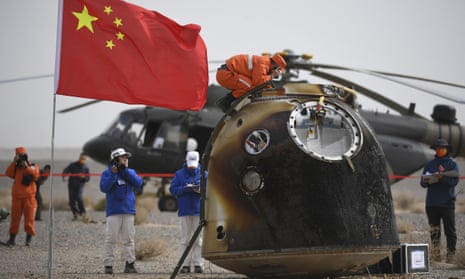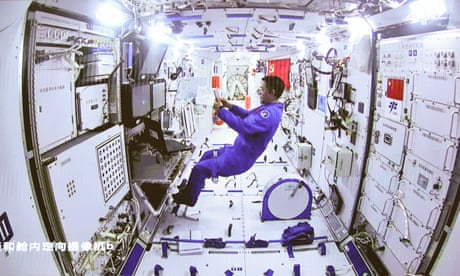Administrator Bill Nelson says Beijing could seek ‘own’ resource-rich areas and next two years could be key to US-China contest

The return capsule of the Shenzhou-13 manned space mission is seen after landing in northern China’s Inner Mongolia autonomous region in April 2022. Photograph: Peng Yuan/APEdward HelmoreMon 2 Jan 2023 14.13 GMT
The US is locked in a space race with China and the country needs to “watch out” that its rival does not gain a foothold and try to dominate lunar resources, Nasa’s top official has warned.
 The space race is back on – but who will win?Read more
The space race is back on – but who will win?Read more
The assessment came from the Nasa administrator, Bill Nelson, a former astronaut and Florida senator, who went on to warn that China could eventually claim to “own” the moon’s resource-rich areas.
The contest between the US and China, he added, was intensifying and the next two years could determine which country achieves an advantage.
“It is a fact: we’re in a space race,” Nelson told Politico. “And it is true that we better watch out that they don’t get to a place on the moon under the guise of scientific research. And it is not beyond the realm of possibility that they say, ‘Keep out, we’re here, this is our territory.’”
Nelson cited Chinese aggression over islands in the South China Sea, where Beijing has established military bases, as evidence of its territorial ambition. “If you doubt that, look at what they did with the Spratly Islands,” he said.
Last year, China’s space program put up an Earth-orbiting space station and has mounted several lunar orbiting and sample-retrieving missions. A third phase of the program, to establish an autonomous lunar research station near the Moon’s south pole, is scheduled for 2025.
In December, the Chinese government offered its vision for a crewed lunar landing, space transportation, infrastructure and space governance. China has also announced the goal of landing taikonauts on the moon by the end of this decade.

Students listen to an introduction to the Chang’e 5 moon sample-return spacecraft, at the InnoTech Expo in Hong Kong, China, last month. Photograph: Tyrone Siu/Reuters
Nasa, meanwhile, recently completed the 26-day Artemis I mission to take pictures of the lunar surface. Future missions are designed toward establishing more activity on the moon. However, the US is also focused on Mars.
US military brass have also sounded alarm over Chinese militarization of space and attendant security concerns.
“It’s entirely possible they could catch up and surpass us,” Space Force Lt Gen Nina Armagno said on a visit to Australia. “The progress they’ve made has been stunning – stunningly fast.”
But Beijing has rejected some US interpretations of the motives behind China’s space push. “Outer space is not a wrestling ground,” Liu Pengyu, spokesperson for the Chinese embassy in Washington, told Politico.
The spokesman said that some US officials had “spoken irresponsibly to misrepresent the normal and legitimate space endeavors of China”.
“China always advocates the peaceful use of outer space, opposes the weaponization of and arms race in outer space, and works actively toward building a community with a shared future for mankind in the space domain,” the statement added.
… as 2023 begins, and you’re joining us from Vietnam, we have a small favour to ask. A new year means new opportunities, and we’re hoping this year gives rise to some much-needed stability and progress. Whatever happens, the Guardian will be there, providing clarity and fearless, independent reporting from around the world, 24/7.
Times are tough, and we know not everyone is in a position to pay for news. But as we’re reader-funded, we rely on the ongoing generosity of those who can afford it. This vital support means millions can continue to read reliable reporting on the events shaping our world. Will you invest in the Guardian this year?
Unlike many others, we have no billionaire owner, meaning we can fearlessly chase the truth and report it with integrity. 2023 will be no different; we will work with trademark determination and passion to bring you journalism that’s always free from commercial or political interference. No one edits our editor or diverts our attention from what’s most important.
With your support, we’ll continue to keep Guardian journalism open and free for everyone to read. When access to information is made equal, greater numbers of people can understand global events and their impact on people and communities. Together, we can demand better from the powerful and fight for democracy.








